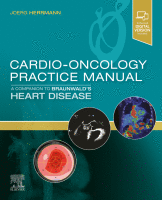Physical Address
304 North Cardinal St.
Dorchester Center, MA 02124

Open full size image KEY POINTS Cancer survivors are a growing population Age at time of cancer treatment, health behaviors, comorbid conditions, genetics, and cancer treatment all weigh into the cardiovascular risk assessment of cancer survivors Anthracycline chemotherapy, mediastinal radiation,…

You’re Reading a Preview Become a Clinical Tree membership for Full access and enjoy Unlimited articles Become membership If you are a member. Log in here

Open full size image KEY POINTS New imaging modalities play a central role in identifying cardiovascular complications. Cardiotoxicity can manifest in a number of ways, depending on the agent, and can include disease states such as heart failure and cardiomyopathy,…

Open full size image KEY POINTS Pulmonary complications in patients with cancer may involve any intrathoracic structures Differential diagnosis of parenchymal infiltrates in patients with cancer includes infection, inflammation, neoplastic involvement, and other miscellaneous diagnoses (e.g., pulmonary edema). Clinical presentation…

Open full size image KEY POINTS Blood pressure measurement is part of the routine assessment during clinic or hospital-delivered cancer care, but should also be measured at home where possible, especially in patients receiving oral cancer therapy, such as vascular…

Open full size image KEY POINTS Atrial fibrillation and other atrial arrhythmias are common complications of many different cancer therapeutics. The CHA 2 DS 2 -VASc and the HAS-BLED scores may not be appropriate to determine thromboembolic and bleeding risk…

Open full size image KEY POINTS Active cancer increases the risk of venous thromboembolism (VTE) by four-fold without chemotherapy and seven-fold with chemotherapy The likelihood of developing VTE is highest during the first 3 months after the cancer diagnosis and…

Open full size image KEY POINTS Patients who have cancer are at risk of developing vascular complications during cancer therapy owing to preexisting cardiovascular disease and/or risk factors and the toxicity potential of cancer therapeutics Three principal presentations of arterial…

Open full size image KEY POINTS Baseline transthoracic echocardiogram is important for the assessment of heart structure and function, and the determination of the presence or absence of pericardial or valvular heart disease prior to initiation of cancer treatment. On…

You’re Reading a Preview Become a Clinical Tree membership for Full access and enjoy Unlimited articles Become membership If you are a member. Log in here